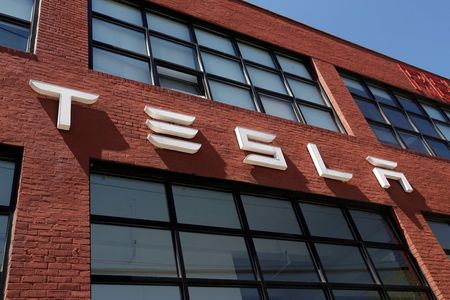By Hyunjoo Jin and Akanksha Rana
(Reuters) -Tesla Inc posted a bigger second-quarter profit than expected on Tuesday thanks to higher sales of its less-expensive electric vehicles, as it raised vehicle prices and cut costs.
Tesla CEO Elon Musk, however, said a global chip shortage that led to temporary factory shutdowns for the automaker, remains serious, and offered no details on the timing of its Cybertruck and next-generation batteries.
For the first time since late 2019, Tesla profits did not rely on sales of environmental credits to other automakers, a sign of increasing financial health for the manufacturing operation.
Shares of the world’s most valuable automaker rose nearly 1% in extended trade.
In a call with investors and analysts, Tesla executives said that volume production growth for this year will depend on parts availability, as it aims to grow deliveries by more than 50%.
Musk said Tesla has “many calls at midnight, 1 a.m., just with suppliers about resolving a lot of the shortages.”
While some people had suggested Tesla build its own chip fab, he pointed to the long leadtime. “That would take us, even moving like lightning, 12 to 18 months,” he said.
Still, Musk said Tesla expects to start limited production this year of the Model Y SUV at factories under construction in Texas and Germany.
Tesla said it has delayed the launch of its Semi truck program to 2022 to focus on starting factories and due to limited availability of battery cells and other parts this year.
Musk did not give a timeframe for when Tesla will start mass production of its new-generation batteries and its much-anticipated Cybertruck.
“It is difficult to say when the last of the technical challenges will be solved,” he said, referring to its 4680 battery cells.
He said Tesla has a backup plan of using its existing 2170 batteries, adding that its battery cell suppliers would double production next year.
The carmaker, led by the billionaire entrepreneur, said revenue jumped to $11.96 billion from $6.04 billion a year earlier, when its California factory was shut down for more than six weeks due to local lockdown orders to fight the pandemic.
Analysts had expected revenue of about $11.3 billion, according to IBES data from Refinitiv.
Excluding items, Tesla posted a profit of $1.45 per share, easily topping analyst expectations for a profit of 98 cents per share.
Tesla said operating income rose with volume growth and cost reduction, which offset higher supply chain costs, lower regulatory credit revenue and other items including $23 million in losses on investment in cryptocurrency bitcoin.
Tesla’s profitability has often relied on selling regulatory credits to other automakers, but in the second quarter, Tesla was profitable without these credits for the first time since the end of 2019. Its GAAP net income was $1.14 billion in the second quarter. Revenue from the credits only totaled $354 million.
“Tesla impressed with its numbers, as most of its revenue came from vehicle sales,” Jesse Cohen, senior analyst at Investing.com, said.
Carmaker Stellantis expects to achieve its European carbon dioxide (CO2) emissions targets this year without environmental credits bought from Tesla.
In an aside, Musk said he “most likely will not be on earnings calls” going forward to discuss financial results with investors and analysts. These calls have been a colorful quarterly ritual Musk has used for discourses on Tesla technology, or to fire back at rivals or critics.
(Reporting by Hyunjoo Jin in Berkeley, Calif and Akanksha Rana in Bengaluru; Additional reporting by Noel Randewich in San Francisco; Editing by Maju Samuel, David Gregorio and Richard Pullin)





